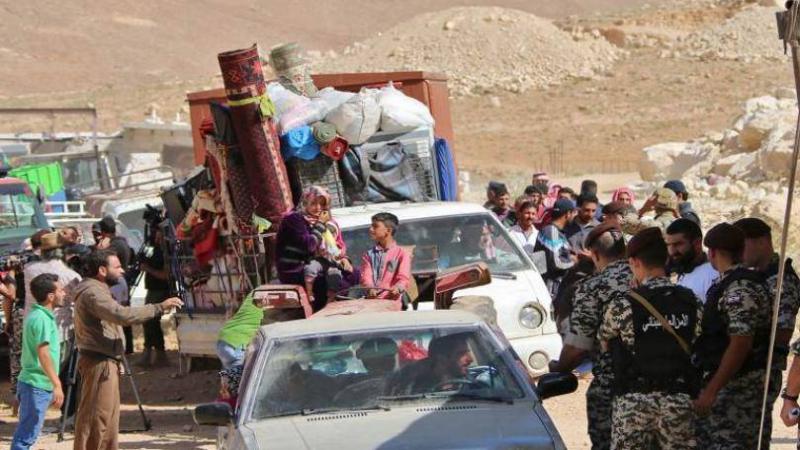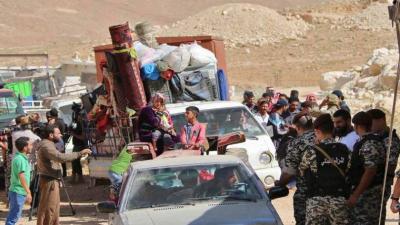The issue of the return of Syrian refugees to their homeland has returned to the starting point, having shifted between the Baabda Palace and Prime Minister Najib Mikati's government, wherein it ignited political skirmishes, particularly between the Minister of Displaced Persons, Issam Sharafeddin, and the Minister of Social Affairs, Hector Hajjar. This dispute led to a public political clash over the conflict of powers, which nearly escalated. The intervention of benevolent mediators prevented further escalation.
Prime Minister Mikati sent a high-level message to UN Secretary-General Antonio Guterres, stating that Lebanon, currently facing an unprecedented crisis, can no longer bear the burden of refugees. He called for various solutions that go beyond the conventional patterns, as the currently implemented measures are insufficient. Mikati demanded the establishment of a plan for the return of Syrians and for its execution.
This starting point centers around the General Security apparatus, which has experience in this area, and has previously facilitated the voluntary return of a notable number of refugees, albeit small compared to the overall population exceeding 1.2 million displaced individuals in Lebanon. The official numbers registered with relevant UN agencies are pending, as they have yet to be announced to Lebanese authorities despite Lebanon's persistent requests.
Major General Abbas Ibrahim, the General Security Director-General, has accepted this challenging task, understanding that the issue is beyond a simple Lebanese official decision; it is related to international decisions and requires Arab financial support. The lack of these elements in previous times led Russia to abandon an initiative it once launched to return refugees.
The urgency of the security situation, amid recent developments and the looming threat of increased unrest in various regions, escalated the challenges of security violations — including crimes of murder and theft, alongside discussions about reactivating sleeper cells. All of these factors necessitated addressing the issue of refugees based on a "make do with what's available" principle until international inhibiting factors are lifted, and a return decision is issued, if such a decision is indeed forthcoming. There are ongoing discussions about attempts to integrate these individuals into host communities.
Alongside General Ibrahim's efforts and the establishment of a technical committee to manage the return file, security measures are being initiated to alleviate the burdens of this presence on Lebanon and its citizens. A substantial number of these individuals have become involved in activities that disrupt security, while others are resorting to illegal emigration via perilous boats, as opportunities for living in Lebanon have diminished and the factors encouraging them to stay have lessened under the pressures of financial collapse.
Lebanese diplomacy then took action. Foreign Minister Abdullah Bou Habib invited the UN High Commissioner for Refugees representative in Lebanon, Ayaki Ito, along with Hajjar, three days ago to discuss ways to enhance cooperation regarding displacement issues. Although the meeting was reported to have a positive atmosphere, a political source close to the government confirmed to "Al-Markazia" that the relationship between Lebanon and the UN organization remains strained, due in part to Mikati's message to Guterres and the UN's refusal to provide Lebanon with official numbers of refugees amounting to approximately 900,000. The UN argued that without a state or government in Lebanon, a comprehensive return plan could not be effectively implemented, as seen in Jordan and Turkey, which established camps for refugees near their borders under state oversight.
The source claimed that Lebanon has politicized the refugee file and has involved itself in deeper turmoil; however, there are still steps that can be taken to control the situation and regulate refugee movements by establishing police stations in the randomly spread camps and managing the borders to prevent registered refugees from returning to Lebanon after transitioning to Syria, nullifying their refugee status and ceasing assistance, while accepting the establishment of a UN monitoring point on the border for better management.
According to President Michel Aoun, the refugees have cost the Lebanese treasury more than $30 billion. The question remains whether seasonal doses of aid and stances will be sufficient to halt the Lebanese bleeding and avoid a social explosion that is imminent unless its triggers are controlled.




